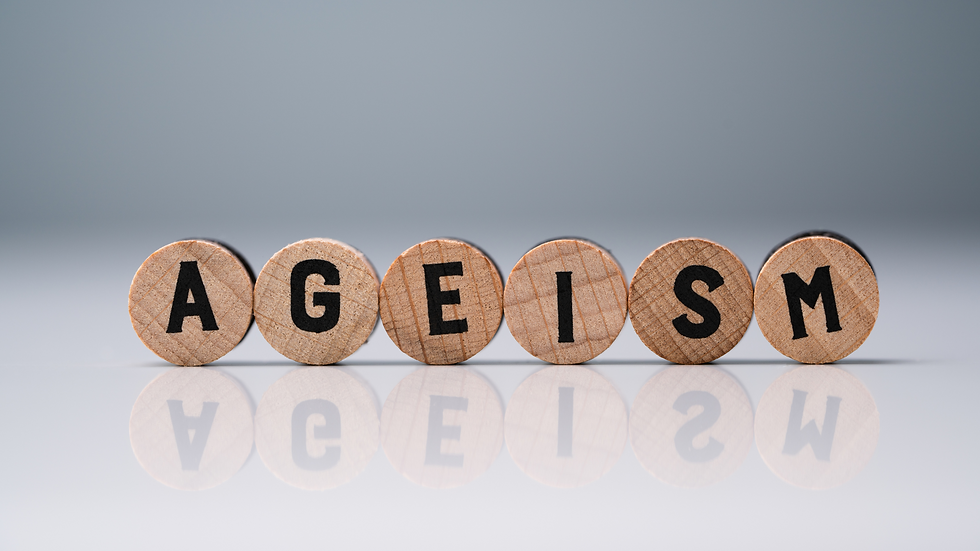
Introduction
Ageism is a deeply rooted societal issue that continues to affect people of all ages, particularly the elderly. It is a combination of stereotypes, prejudices, and discrimination based on one's age, and it often leads to harmful stereotypes and biases against older individuals. Just like any other form of prejudice, ageism is unjust and has serious consequences for both individuals and society as a whole. Although ageism includes any form of age-based discrimination, we’ll be focusing specifically on discrimination against older people. In this blog article, we will delve into the damaging effects of ageism and explore ways to combat this problem.
Ageism: The Hidden Prejudice
Ageism can manifest in various ways, from subtle remarks to more overt exclusion and marginalization of older people in different spheres of life. The media, for instance, frequently portrays older adults as frail, technologically-challenged, or mentally slow, perpetuating negative stereotypes that further reinforce ageism. Furthermore, many media stories celebrate those who conceal their true age in pursuit of “youthful beauty.” Why does society look down on looking old? These stereotypes not only belittle older individuals but also disregard the wealth of knowledge, experience, and contributions they bring to society.
The Workplace and Age Discrimination
Although there is legislation against age-based discrimination in the workplace, this deeply-ingrained practice has yet to be fully eliminated. Older employees are often subjected to unfair treatment, denied equal opportunities, or pushed towards early retirement despite their qualifications and abilities. Some employers falsely believe that fresh, new ideas can only come from younger generations. This not only harms the affected individuals but also deprives organizations of valuable expertise that could have contributed significantly to their growth and success.
Ageism's Impact on Mental Health
Being on the receiving end of ageism can have severe consequences for a person's mental health. Constant exposure to negative stereotypes and discriminatory behavior can lead to feelings of worthlessness, isolation, and depression in older individuals. It can create a self-fulfilling prophecy, making them believe they are incapable or unwanted. Many studies have found tangible declines in seniors’ physical and cognitive health as a result of ageism. For example, Ribeiro-Gonçalves et al. (2023) finds that seniors over the age of 60 experienced moderate levels of ageism and corresponding levels of psychological distress and loneliness.
The Importance of Respect and Inclusivity
Everybody can work towards a future without ageism. We must cultivate a culture of respect, empathy, and inclusivity that appreciates individuals of all ages. Rather than focusing on the limitations associated with age, we should recognize the unique strengths that come with life experience. Embracing a diverse workforce, including employees of different age groups, fosters creativity, innovation, and a more dynamic work environment. Being cognizant of the ways we refer to specific age groups and the language that we use can gradually change the attitudes of those around us about age. In social settings, it’s important to recognize and minimize our own biases against elderly individuals and their abilities, experiences, opinions, or personality.
Challenging Ageist Attitudes
It is essential to confront ageist attitudes whenever and wherever we encounter them. This means being mindful of our language, avoiding age-related jokes or derogatory terms, and addressing ageism in conversations with friends, family, and colleagues. It is important to keep in mind that change starts from within: take the time to identify situations where your words or actions may be ageist, then make a plan for how you can work on reducing these. Education and awareness campaigns can also play a significant role in challenging stereotypes and promoting intergenerational understanding.
Promoting Intergenerational Connections
Breaking down age-related barriers can be achieved through intergenerational connections. Encouraging interactions between different age groups fosters mutual understanding and respect. Community programs that promote mentorship and knowledge sharing between older and younger individuals have shown great success in combatting ageism and building stronger communities.
Conclusion
Ageism is a serious societal issue that affects people of all ages, but it disproportionately impacts the elderly. To build a fair and inclusive society, we must actively challenge ageist attitudes and stereotypes. Embracing diversity, promoting intergenerational connections, and advocating for equitable laws and policies can create a world where age is not a barrier to opportunities and respect. By saying no to ageism, we pave the way for a brighter future, where every individual is valued for their unique contributions, regardless of their age.

Comments